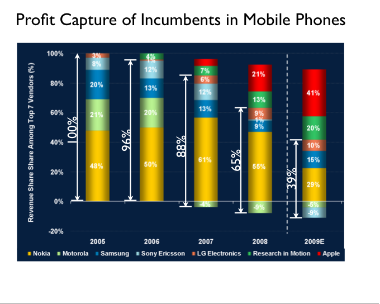 In 5 years, Incumbent profits from the mobile phone industry went from 100% share to 39% share. If this is not indicative of a successful (i.e. disruptive) entry, I don’t know what is.
In 5 years, Incumbent profits from the mobile phone industry went from 100% share to 39% share. If this is not indicative of a successful (i.e. disruptive) entry, I don’t know what is.
Year: 2010
Keeping it Real
 From the VP of marketing for the Limo Foundation:
From the VP of marketing for the Limo Foundation:
Growth within the siloed Apple ecosystem will actually stifle the grass-roots innovation
It’s interesting that this comment came on the day after Rob Glaser left Real Networks. Let’s take a stroll down memory lane of Glaser quotes:
(in 2003) “It’s absolutely clear now why five years from now, Apple will have 3 (percent) to 5 percent of the player market. … The history of the world is that hybridization yields better results.”
“Apple’s (market) share will go down if they continue to do this. The only way to presently put songs on an iPod is to (buy) them from iTunes.”
The (unforeseen) standard that emerged from the iPod is iTunes marketplace. It allowed Apple to establish itself as the premier and dominant merchant of all media including disruptive new media like apps. The iPod was “closed”, “siloed” and “locked-in” users. But it worked and grew and grew to the point where it set the standard.
The same arguments raised against the iPhone were raised against the iPod and Windows before it. Last I checked iPod had 70% share 9 years after the launch and Windows has 90% share 20 years after launch. iTunes sells more songs than any other retailer on the planet and more apps that anyone imagined possible.
Perhaps this data bears repeating:
- 140,000 apps – made by over 28,000 developers
- Users downloaded an average of 3.7 apps each in December.
- One Quarter of apps downloaded are paid. Average cost of $2.59/app.
- Each iPhone user spends an average of $10/mo.
- There are over 75 (est.) million active users
- 200 million apps are being downloaded every month
- $500 million in revenues each month. 70% to developers or $385 million
All these numbers are increasing and accelerating. iPhone Platform Fastest Ecosystem Ramp in History.
Apps are not Applications
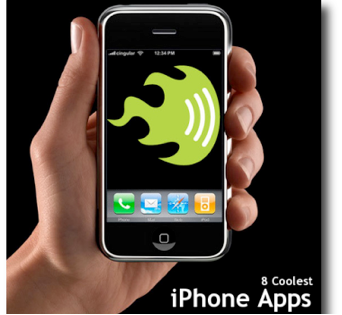 Understanding the new world of apps. Apps are not Applications.
Understanding the new world of apps. Apps are not Applications.
That should have been the first sign that the software market was changing. It’s obvious in retrospect; people were buying software that would make them laugh. This runs counter to the common understanding of an Application. An Application represents the developer’s best effort at creating software that applies the capabilities of the device to solving a specific problem. Making people laugh is not a problem an Application can solve; it’s not about the device it’s about the person using it.
Lots more clues here:
http://kickingbear.com/blog/archives/67
I always said that the App is a new art form. As much art as desktop publishing and web design and home videos done by the masses. It’s not pretty but it’s real.
150k apps by end of Jan
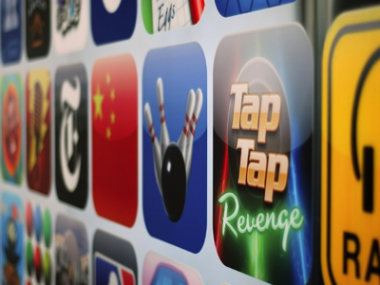 At least 22k apps were added in December. It looks like we’re on track for Jobs to announce 150k apps by the time of the tablet announcement. By one count, 147k apps have already been published to the App store.
At least 22k apps were added in December. It looks like we’re on track for Jobs to announce 150k apps by the time of the tablet announcement. By one count, 147k apps have already been published to the App store.
The last 50k apps will have taken 3 months. Download rate now is about 300 apps per second.
UPDATE: Jobs announced 140k apps on Jan 27.
77 % des téléphones vendus par Orange à Noël ont été des iPhone
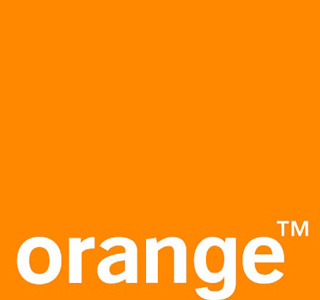 http://www.lesechos.fr/info/hightec/020299379592–77-des-telephones-vendus-par-orange-a-noel-ont-ete-des-iphone-.htm
http://www.lesechos.fr/info/hightec/020299379592–77-des-telephones-vendus-par-orange-a-noel-ont-ete-des-iphone-.htm
A loose translation:
France Telecom CEO Didier Lombard:
Remember that at Christmas, 77% of telephones with a fixed-rate tariff that Orange sold were iPhones! It’s amazing. I cannot say why so many other mobile telephone manufacturers have fallen so far behind and have been unable to catch-up.
I am still trying to get my head around this data point. Is it an anomaly? Is France unique or is this a Christmas-only phenomenon? Other data points also showed that iPhone is phenomenally popular in France, but this is unheard of. Would broad availability in the US also lead to >50% market share of all phones sold? Could the possibility of runaway, iPod-like, Apple monopoly of the sector be contemplated? Anecdotally, I also observed a large number of iPhones while in Terminal 3 at Heathrow.
Google the Shopkeeper
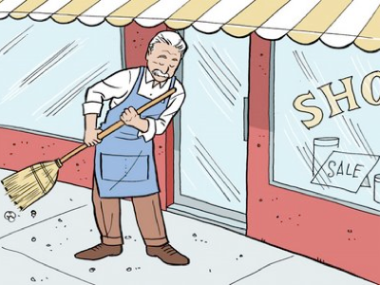 The Nexus One is an HTC branded and developed phone. The only thing that Google is doing (beside the software) is acting as retailer.
The Nexus One is an HTC branded and developed phone. The only thing that Google is doing (beside the software) is acting as retailer.
Still don’t see what the point is as a Web page does not make a very good retail experience for a phone. It reminds me of when the iPhone was launched, Apple’s head of retail said that their stores were basically “built for this type of product”.
http://www.engadget.com/2010/01/05/googles-nexus-one-is-official/
Om Malik Interviews Google’s Mobile Chief Andy Rubin
Regarding Android partners like Verizon and Motorola being upset about the Nexus One:
“People shouldn’t focus too much on the device (Nexus One),” said Rubin. “What’s more important is the strategy behind the devices.”
John Gruber:
Yes, what better way to get the press not to focus on a device than to hold a big press conference to announce a device, talk about how great it is, and give one away to everyone who attends?

